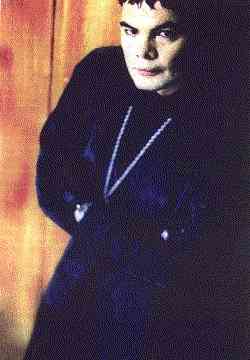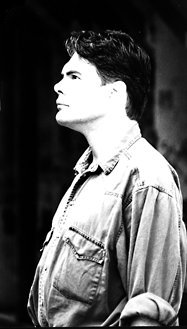 Blue Jean: Let's start from the beginning, as I have always wanted to
talk to you. Since I have found such an opportunity, you won't be able to
escape. Let me start by saying this will be a long interview.
Blue Jean: Let's start from the beginning, as I have always wanted to
talk to you. Since I have found such an opportunity, you won't be able to
escape. Let me start by saying this will be a long interview.
October 29, 1995
by Sureyya Izgi
Translated by Kursat Pasinlioglu & Emma Troupe
 Blue Jean: Let's start from the beginning, as I have always wanted to
talk to you. Since I have found such an opportunity, you won't be able to
escape. Let me start by saying this will be a long interview.
Blue Jean: Let's start from the beginning, as I have always wanted to
talk to you. Since I have found such an opportunity, you won't be able to
escape. Let me start by saying this will be a long interview.
Marian Gold: I don't think so! (laughs)
BJ: How did Alphaville form?
MG: If you like, I'll start by telling you our lives before Alphaville. At the
end of the 70s, that is when we were young, we were very interested in
politics. We were fanatic leftists. You know, it was a time when we were
rebels. You won't believe this, but we had really extreme messages in our
very first songs like 'pull down the government, kill the politicians' etc.
I was crazy with extreme ideas. I was a communist who believed that it was
possible to create a revolution with the support of art and artists at that
times. I lived in an occupied house called a squat in Berlin. There were
poets, painters, singers, musicians; in other words only artists in communism.
When I met Bernhard Lloyd and Frank Mertens in this environment, we recorded
some tracks we did all together. One day something incredible happened: we
decided we would give a concert.
We ourselves couldn't believe it. The interesting thing is that people came
to our show. It was something that we never expected before. This was the
foundation of Alphaville.
During the 80s, the life and clubs were very colourful in Berlin. Synthesizers
became common in music and we were part of the popular New Wave scene.
BJ: All right. As a German band, how did you find your place in the musical industry which is dominated by British and Americans?
MG: We were certainly an exception. But there were some well-known bands making experimental music in Germany at the end of the 60s and 70s like Kraftwerk, CAN, etc. But, these were classified as New Age and they remained experimental. At that time, everybody was wondering why there were no German groups who could sing. We tried it and it was successful. But, we can't be considered as a vanguard because after Alphaville, there were no other bands from Germany. That is to say, we always stayed an exception. I don't find the other German bands interesting. The music of the end of 80s, acid, hip hop, techno and rave is not music we understand. We were the only members of the dominant New Wave club from Germany at that time. We were lucky...
BJ: You mean it was by luck that Alphaville succeeded?
MG: Yeah, we were definitely lucky. There was no a master plan behind our success. It was not a planned and aimed success. We tried and achieved it. Let me explain it in this way: "Big in Japan" was actually one of our oldest songs. After writing it in 1978, I had considered it 'a terrible song' and hated it. But, we became famous with it. You see, it was not planned, it's just that the timing was very good. In addition to chance, the difference of our music and belonging to a new trend naturally played an important part in our success. We became famous with the song "Big in Japan" which I hated when I first wrote it and it was going well. We only had one problem: our manager. He was trying to give us a different image than what we wanted, and made us wear some strange jumpers on stage. I hated doing such things. After becoming famous, we got some money and I fired him immediately. So we all took off our jumpers...
BJ: "Big in Japan" is what you call the stage before the overdose in the junk culture. Is there any relation between the song and this fact?
MG: No, I did not think of that while writing the song. Despite its ironic content, it was purely a musical approach. As you know, there is a considerable musical market in Japan. If you want to become famous and get money, what you should do is form a hardrock group and then release an album in Japan; it will definitely be sold. Despite the fact that nobody knows them in Europe, they are 'big in Japan'. In a way, it's a reproach and a scorn due to their breeze attitude. Like saying 'oh well, they are big in Japan! But what about here? ' And, it's nothing to do with the junk culture; but let me say what I did: I knew a boy and a girl who were junkies. They were trying to escape from it but could not succeed. I also had some problems with that and found the words "Big in Japan" very suitable to my feelings at that time. I had considered it an extreme expression and dedicated it to them. I escaped from junk without going into it too much.
BJ: I'm still raking up Alphaville's past. Why did Frank Mertens leave Alphaville?
MG: As I said, there was not a plan for the future: we were planning to give a few concerts and pick up some beautiful girls. But, after the success and musical progress we made with the "Forever Young" album, Frank began to show the white feather. He was not ready for all this. Some of the hits of the first album were written by him and he became flighty. Then he found a new girlfriend. Perhaps because of her, he experienced a Yoko Ono syndrome and then drew away from us. To complete the contract with the record company he made several solo singles but they were not successful and he's working in his father's place at the moment. He doesn't deal with music anymore.
BJ: I don't want to go on about the great success of "Big in Japan", "Sounds Like a Melody", "Dance With Me" that everybody knows quite well, but, I would like to pass to the concept of "S.M.I2.L.E" on the "Afternoons in Utopia" album. What was the abbreviation of "Space Migration - Intelligence Increase - Life Extension", S.M.I2.L.E and why was it the general logo of that album?
MG: While we were working on that album, my mind was full of the books of Robert Anton Wilson. Believing in space and as a futurist writer, Wilson's idea S.M.I2.L.E was briefly that there was a better life waiting for us in outer space. I was greatly affected by it, and so I used it.
BJ: What did you do after "The Breathtaking Blue" album? Many people, including myself, thought that Alphaville had split...
MG: We did not split but we came quite close. That album was prepared after a very strange pre-production stage. It was an album with a wide spectrum ranging from big band to rock. I had designed "Forever Young" as an album including the best pop songs in it. It was as if the band were working together for a hundred years and then put their best songs in it. On the other hand, "Afternoons in Utopia" was a kind of pop-opera. By listening to the music alone, you would understand half of it, and with the lyrics it would be the whole with a stage performance completing its meaning, in a pop-opera manner. But, there was no such idea behind "The Breathtaking Blue". There was no connection between the tracks and there was no concept. Each song had a different address. It was indeed a beautiful album from a musical point of view, but from the interpersonal relations and Alphaville point of view, it was terrible. Bernhard and I quarrelled quite a lot. All these quarrels were offensive and were preventing our productivity. There was a balance when Frank was in the band as there were two extreme members, me and Frank, and Bernhard was in the middle which meant a balance. But, after Frank left, Bernhard tried to be the other extreme and we could not stay together like two competitors. We finished the album with difficulty and after the recording I was thinking that perhaps we would not work together anymore, and this was the last Alphaville album.
BJ: Is this why Alphaville have different members in studio and in the concerts? Bernhard and Ricky are not part of the tour...
MG: This was the most peaceful solution we found. We did not work for two years after "the Breathtaking Blue" and almost didn't see each other. But, at last Ricky forced us and said "Come on, let's work and make an album". We found that we had mellowed in the previous two years. We could now be more tolerant of each other. It was stupid and definitely not a professional way of running a play whose leading roles are shared by me, Ricky and Bernhard. In the end, we found a peaceful solution coming together and working in studio only, and being on tour with concert musicians.
 BJ: All right, what changed with Alphaville between 80s and 90s?
BJ: All right, what changed with Alphaville between 80s and 90s?
MG: Actually there was no change, it was a process and a development. For instance, you can see some clues of "Prostitute" in "Forever Young". But, it has matured and grown. As I say in the last song of "Prostitute", Apollo; this album is the end of a certain mentality. A certain development has come to its conclusion. With "Prostitute", a certain epoch for Alphaville has been closed, and the next album will be a different one with a new concept!
BJ: I want to ask about that, as well; it says 'this is the end of show, I don't know was I wrong or was I right..'. Does this mean it's the end of Alphaville?
MG: No, no. It's the end of the process I mentioned and the song.
BJ: What do you think about Bosnia, as a person who's saying 'Democracy is just a lie..' in "Fools"?
MG: It's one of the subjects I have never understood. Think of the fact that
just a while ago, the same things happened in Europe. What the Nazis did to
the Jews is done by the Serbs to the Bosnians and Croatians. And, those who
condemn Nazis each time are just watching what's happening in Bosnia. I never
understood the weapon embargo applied to Bosnians, as they have been already
subjected to attack, and they don't have anything to defend themselves. When
Nato air forces stopped Serbians it was seen that what they experienced could
be prevented. So why did they wait? And, why was there a weapons embargo for
Bosnians? I can't believe that all these things are happening in the middle
of Europe. I think the main reason for this massacre is the fact that all the
people there are muslims. I am very nervous on this subject and get crazy
whenever it comes to my mind.
With regard to the lyrics in "Fools"; one should consider not only that part,
but the whole of it. And I may say that democracy is our biggest privilege,
of course. But, if you're rich enough you do not deal with the government;
and if you're poor, you emphasize more the necessity of change of the
government. We tried to give that message.
BJ: Okay, let's talk about your solo career. I know that you have recorded a new solo album called "Feathers and Tar", after "So Long Celeste".
MG: Impossible! How do you know that?
BJ: I've even listened to it!
MG: What, what, how?
BJ: You will not believe but I've even listened to the new demo of Alphaville "Come the Night". It's great!
MG: What?
BJ: Yeah, I have a spy in Alphaville. Okay, okay.. just a while ago your manager KP allowed me to listen to them in his room!
MG: Impossible! So it's time to change my manager! But, actually there is nothing to be hidden; as you heard, it's completed and is waiting for the day of its release. Actually, only KP, our manager, knows but the first single will be released in April and "Feathers and Tar" will be released between March and June.
BJ: If the new Alphaville album does not come in between, of course...
MG: How do you know this?
BJ: Er... KP told me that there will be a new album in spring 1996..
MG: KP! Yes, after coming back to Germany we'll start the recording of the new album. We have some finished tracks.
BJ: Let me come back to "Feathers and Tar". Why did you cover "Five Years" by David Bowie?
MG: Because David Bowie is my biggest idol. Actually, it's not a very good idea to cover something. Nobody can make it better than the original one. That's to say, it's not covered with this purpose. You can vary it with your own interpretation. I did not play with the main theme of the song, but covered it with waltz rhythms, drums and modernized it with a vocalist who is from South Africa. Why did I cover it? This song is from 1973. It says something like 'The end of the world will come very soon in 1978'. I waited till 1978, to see whether what this man said was true; but nothing happened. However, I did not lose my faith in Bowie. While working on this album, I thought "we're in 1995, in other words something may happen in five years' time, in the year 2000" and covered the song I already liked very much. I think it's a good time from a timing point of view.
 BJ: What about the other cover; "Say it Ain't So, Joe" by Murray Head?
BJ: What about the other cover; "Say it Ain't So, Joe" by Murray Head?
MG: The producer of the album is Rupert Hine who has worked with Tina Turner,
Chris De Burgh and Stevie Nicks in the past. Besides, the two greatest albums
of the 80s for me were Rupert's solo albums. We were looking for a cover with
him before recording. We listened to the songs, but could not come to an
agreement for certain tracks. One day, he came to studio with Murray Head's
album and said "listen to it". I had not particularly liked the track he
proposed.
But, I liked the next one: "Say it Ain't So, Joe" and decided to cover that.
But we had some trouble with the lyrics as it was not written in the booklet.
Rupert said "No problem, I'll call Murray and he can send them". When we
called London, we were in shock as Murray was also recording the same song
again. After letting us use the song, he even said "I can even recommend you
an engineer to record it" and we accepted. We found that guy in London, and
then he came to Paris where we recorded the album. This time, the engineer
was in shock as he had remixed this song just a week ago for another singer.
So "Say it Ain't So, Joe" was a cover full of strange events.
BJ: All right Marian, that was my last question. I want to thank you for this interview that is a very important one for me. It was one of the most incredible events for to meet you, my childhood hero...
MG: Thanks for your interest.